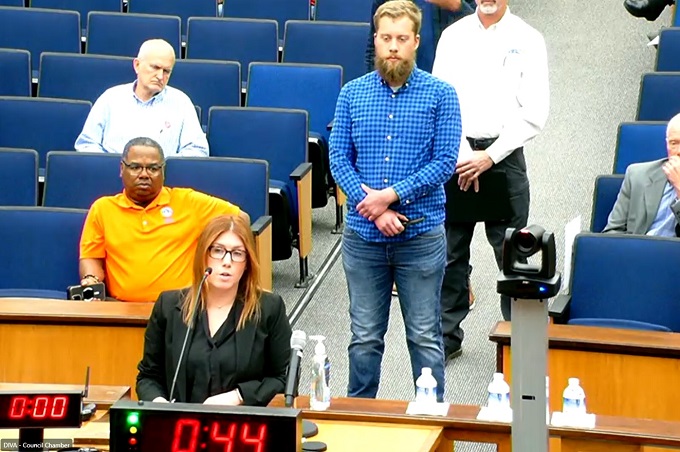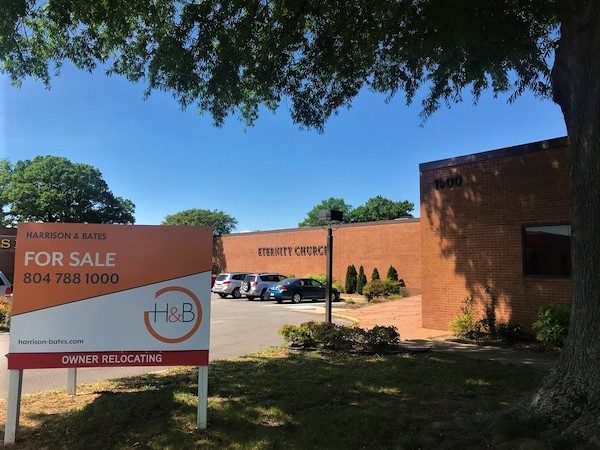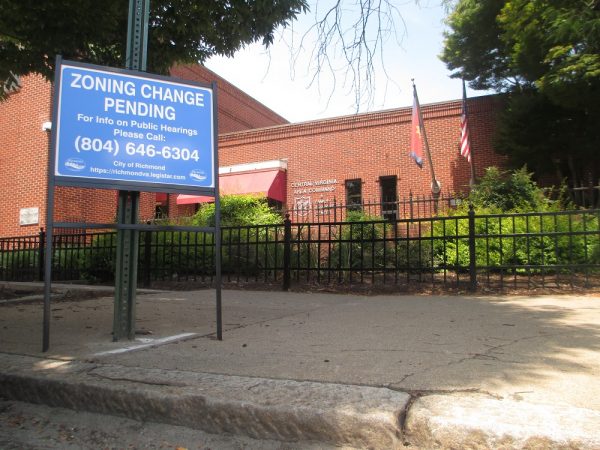
Opponents lined up to speak in Thursday’s public hearing on a plan to increase shelter bed capacity at the area’s Salvation Army future headquarters on Chamberlayne Avenue. (Screenshot)
A proposal by the city to add more emergency shelter beds at the Salvation Army’s future headquarters on Chamberlayne Avenue is being met with pushback from business owners in Richmond’s Northside and a threat of legal action.
Opponents of the proposal, which is part of a larger plan to enhance services for the homeless in the city and increase year-round shelter capacity, include members of the Chamberlayne Industrial Center Association and other residents and business owners.
They say that they’re not against providing shelter for those in need, but that they were not properly notified of the plan by the city and only learned of it from a report in Richmond BizSense last month.
In a public hearing Thursday before City Council’s Education and Human Services Standing Committee, Dave Kohler, president of the Chamberlayne association, said it would take legal action if council approves the proposal this Monday, one week after the plan was formally introduced by council.
“If it goes through, there will be an injunction filed, just FYI,” Kohler told councilmembers. The association has retained Kutak Rock attorney Jeremy Williams, according to a letter it sent to councilmembers last week.
Committee chairwoman Stephanie Lynch and fellow councilmembers Andreas Addison and Ann-Frances Lambert, whose district includes the Salvation Army site at 1900 Chamberlayne Ave., maintained that the city has been struggling to secure a permanent year-round shelter location for years and that this plan has been in discussions since the spring and presented to the committee in September and October.

The Salvation Army bought the former Eternity Church property at 1900 Chamberlayne Ave. for its regional headquarters in 2019. (BizSense file photo)
They stressed that the Salvation Army proposal is one part of a larger plan that ultimately would put a shelter in each of the city’s nine magisterial districts. They also emphasized the need to open an inclement weather shelter at the site, which served as the city’s cold weather shelter last year under a different operator, before lower temperatures arrive in December.
“We’re not trying to force this down, but time is of the essence,” Lambert said.
The city is aiming to open an inclement weather shelter at the site by Dec. 1, with 100 beds for homeless families and adults to be added to the roughly 50 beds that the Salvation Army already provides there. Half of those beds would become year-round beds for individuals by next May.
Other parts of the larger plan include using the former HI Richmond Hostel building at 7 N. Second St. downtown as additional shelter capacity, and potentially a site at 10 E. Belt Blvd. in Southside that, collectively, would increase the total number of available year-round shelter beds in the city from 209 to 321 – a 54 percent increase within the regional Greater Richmond Continuum of Care services network.
The Salvation Army part of the plan would occur first, allowing for the inclement weather shelter and laying the groundwork for a long-term shelter location. Council’s vote at its meeting this Monday would approve a grant contract with the Salvation Army that would contribute $7 million in city funds toward the nonprofit’s $15 million rehab to turn the building into its planned Center of Hope.

Salvation Army is planning a $15 million renovation to turn the building into a facility called Center of Hope. (Image courtesy Salvation Army)
The city also would lease part of the building from the Salvation Army for a housing resource center, which advocates have said is needed to provide a physical point of entry for those seeking services and case management in the Richmond region’s network. That point of entry had been the Commonwealth Catholic Charities building at 511 W. Grace St., which Daily Planet Health Services purchased in 2020.
Opponents who spoke at Thursday’s hearing asked for a more equitable arrangement across the city, citing crime and other incidents that they said stemmed from last year’s inclement weather shelter at the Salvation Army site. That shelter was operated by Commonwealth Catholic Charities; this year’s shelter would be run by the Salvation Army, councilmembers noted.
Previous years saw the inclement weather shelter at various locations around town, such as the Quality Inn Central hotel on Arthur Ashe Boulevard, now slated for redevelopment. Commonwealth Catholic Charities, which operates several facilities around town, had sought to open a cold weather shelter in Manchester at the former Community Bainbridge Baptist Church. Neighborhood opposition to that proposal prompted the organization to terminate a contract it had on the property.
Similar opposition limited the number of beds at the Salvation Army site when it announced plans to move its headquarters from downtown in 2020. The larger space was to accommodate about 50 more beds, bringing its total capacity to 100, but the number of beds has been kept to about 50 since then.

A zoning change sign outside the Salvation Army’s downtown building on Grace Street in 2019. (BizSense file photo)
“It’s unfair that all the shelter gets located in our backyard and no other district,” said Mike Salmon, president of Talley Sign Co. on Chamberlayne, in Thursday’s hearing.
Alex Lugovoy, owner of local real estate firm Dobrin Property Management, added that increasing shelter capacity at the site would be detrimental to the corridor’s development.
“That district is a neighborhood in bloom, and you guys are risking putting that neighborhood back 20 years,” Lugovoy said. “You’ve got something close to Scott’s Addition, and you guys are going to ruin it, unfortunately.”
In 2021, the city initiated changes to several zoning districts, including the M-1 manufacturing district that includes the Chamberlayne site, that added shelters as a permissible use in that district. The change means that the Salvation Army property can be used as a shelter by right, without the need for a special-use permit.
The city’s deal with the Salvation Army includes an option that, if the nonprofit doesn’t raise its portion of the $15 million project within three years, the city would be able to purchase the Chamberlayne property for $4.5 million at the end of its three-year lease for the housing resource center.
City Council is scheduled to hold its own public hearing before voting on the Salvation Army deal at its 6 p.m. meeting Monday.

Opponents lined up to speak in Thursday’s public hearing on a plan to increase shelter bed capacity at the area’s Salvation Army future headquarters on Chamberlayne Avenue. (Screenshot)
A proposal by the city to add more emergency shelter beds at the Salvation Army’s future headquarters on Chamberlayne Avenue is being met with pushback from business owners in Richmond’s Northside and a threat of legal action.
Opponents of the proposal, which is part of a larger plan to enhance services for the homeless in the city and increase year-round shelter capacity, include members of the Chamberlayne Industrial Center Association and other residents and business owners.
They say that they’re not against providing shelter for those in need, but that they were not properly notified of the plan by the city and only learned of it from a report in Richmond BizSense last month.
In a public hearing Thursday before City Council’s Education and Human Services Standing Committee, Dave Kohler, president of the Chamberlayne association, said it would take legal action if council approves the proposal this Monday, one week after the plan was formally introduced by council.
“If it goes through, there will be an injunction filed, just FYI,” Kohler told councilmembers. The association has retained Kutak Rock attorney Jeremy Williams, according to a letter it sent to councilmembers last week.
Committee chairwoman Stephanie Lynch and fellow councilmembers Andreas Addison and Ann-Frances Lambert, whose district includes the Salvation Army site at 1900 Chamberlayne Ave., maintained that the city has been struggling to secure a permanent year-round shelter location for years and that this plan has been in discussions since the spring and presented to the committee in September and October.

The Salvation Army bought the former Eternity Church property at 1900 Chamberlayne Ave. for its regional headquarters in 2019. (BizSense file photo)
They stressed that the Salvation Army proposal is one part of a larger plan that ultimately would put a shelter in each of the city’s nine magisterial districts. They also emphasized the need to open an inclement weather shelter at the site, which served as the city’s cold weather shelter last year under a different operator, before lower temperatures arrive in December.
“We’re not trying to force this down, but time is of the essence,” Lambert said.
The city is aiming to open an inclement weather shelter at the site by Dec. 1, with 100 beds for homeless families and adults to be added to the roughly 50 beds that the Salvation Army already provides there. Half of those beds would become year-round beds for individuals by next May.
Other parts of the larger plan include using the former HI Richmond Hostel building at 7 N. Second St. downtown as additional shelter capacity, and potentially a site at 10 E. Belt Blvd. in Southside that, collectively, would increase the total number of available year-round shelter beds in the city from 209 to 321 – a 54 percent increase within the regional Greater Richmond Continuum of Care services network.
The Salvation Army part of the plan would occur first, allowing for the inclement weather shelter and laying the groundwork for a long-term shelter location. Council’s vote at its meeting this Monday would approve a grant contract with the Salvation Army that would contribute $7 million in city funds toward the nonprofit’s $15 million rehab to turn the building into its planned Center of Hope.

Salvation Army is planning a $15 million renovation to turn the building into a facility called Center of Hope. (Image courtesy Salvation Army)
The city also would lease part of the building from the Salvation Army for a housing resource center, which advocates have said is needed to provide a physical point of entry for those seeking services and case management in the Richmond region’s network. That point of entry had been the Commonwealth Catholic Charities building at 511 W. Grace St., which Daily Planet Health Services purchased in 2020.
Opponents who spoke at Thursday’s hearing asked for a more equitable arrangement across the city, citing crime and other incidents that they said stemmed from last year’s inclement weather shelter at the Salvation Army site. That shelter was operated by Commonwealth Catholic Charities; this year’s shelter would be run by the Salvation Army, councilmembers noted.
Previous years saw the inclement weather shelter at various locations around town, such as the Quality Inn Central hotel on Arthur Ashe Boulevard, now slated for redevelopment. Commonwealth Catholic Charities, which operates several facilities around town, had sought to open a cold weather shelter in Manchester at the former Community Bainbridge Baptist Church. Neighborhood opposition to that proposal prompted the organization to terminate a contract it had on the property.
Similar opposition limited the number of beds at the Salvation Army site when it announced plans to move its headquarters from downtown in 2020. The larger space was to accommodate about 50 more beds, bringing its total capacity to 100, but the number of beds has been kept to about 50 since then.

A zoning change sign outside the Salvation Army’s downtown building on Grace Street in 2019. (BizSense file photo)
“It’s unfair that all the shelter gets located in our backyard and no other district,” said Mike Salmon, president of Talley Sign Co. on Chamberlayne, in Thursday’s hearing.
Alex Lugovoy, owner of local real estate firm Dobrin Property Management, added that increasing shelter capacity at the site would be detrimental to the corridor’s development.
“That district is a neighborhood in bloom, and you guys are risking putting that neighborhood back 20 years,” Lugovoy said. “You’ve got something close to Scott’s Addition, and you guys are going to ruin it, unfortunately.”
In 2021, the city initiated changes to several zoning districts, including the M-1 manufacturing district that includes the Chamberlayne site, that added shelters as a permissible use in that district. The change means that the Salvation Army property can be used as a shelter by right, without the need for a special-use permit.
The city’s deal with the Salvation Army includes an option that, if the nonprofit doesn’t raise its portion of the $15 million project within three years, the city would be able to purchase the Chamberlayne property for $4.5 million at the end of its three-year lease for the housing resource center.
City Council is scheduled to hold its own public hearing before voting on the Salvation Army deal at its 6 p.m. meeting Monday.



As someone with 12 years of experience working within the shelter system, I applaud Richmond for trying to do the right thing. There will always be those seeking to block the path of progress. Just keep moving forward.
You appear to have more expertise with the homeless than I do. I do wonder, however, whether providing permanent shelter is a good idea. I think most everyone agrees on the need for short term emergency shelter, especially in cold weather. What worries me is that we, as a society, have instilled in too many people a sense of victimhood which robs them of their agency (their belief that they possess the power to improve their lot in life). We have made husbands optional. To the extent that the City funds shelters, we are making people rely upon taxpayers rather… Read more »
I would argue that “permanent” is a flexible term for most users of the shelter. Without stable housing, it’s difficult to find and maintain employment, education, and healthcare. A period in a shelter is often the respite someone needs to move their life forward.
“a sense of victimhood”? Really? For those who are working poor where wages have fallen behind costs? For the jacked up housing costs? For the continued suppression of minimum wage? For the 5 million Americans behind on their mortgage payments? For the hollowed out mental healthcare system? For the shortage of housing at all levels?
I hope you find some compassion in others if and when you need it in your life.
Strong NIMBY vibes here…if the plan calls for one shelter in each of the 9 city districts and this one already exists, why not enhance it?
“‘It’s unfair that all the shelter gets located in our backyard and no other district,’ said Mike Salmon, president of Talley Sign Co. on Chamberlayne, in Thursday’s hearing.”
As a former employee for a non-profit who dealt extensively with shelters across the city, the shelters go where the need exists. It’s of no use to the homeless to place a shelter in a location they can’t access. I completely understand the citizens’ concerns here; we can’t invalidate those concerns. I just do not think moving the shelter elsewhere is the answer.
Richmond has not done the right thing. They have hidden this from it’s constituents. My experience being next door, is they are not neighbors any business would want. It’s the density that is the problem. To suggest that there are not needs in the other districts is inaccurate. The plan also completely violates the plan the city paid $200K-$300K for. The horrible governance continues. We have been doing business in Richmond since 1946 and paying our bills. They intentionally kept it from us because it would be met with resistance. Their words, not mine. Is that right? The level of… Read more »
so they’re not against a shelter …. they’re just against a shelter in their neighborhood. Got it!
These people in this area need a break .
“You build it, they will come.” We understand the need is everywhere. Prior to the casino defeat they were going to clean up the Walmsley area and move them to 1900. Like I said, the density is the problem. We will be left to deal with the extra trash, defecation, bullet holes in the ceiling, loitering in the lot scaring our employees, etc…. They have tried to ram this through under cover. Operate the inclement weather shelter (50 beds) like you did before. Let’s work to find a solution that doesn’t put 40%-50% of the needs in one location in… Read more »
I live near the Salvation Army’s site on Grace, and while problems associated with housing the homeless are frustrating, I welcome each and every bed in every place we can put them. The alternative is someone sleeping on the street, in the woods, or between the double doors of my building. We’re a metro area with a population of 1 million and we think a shelter with 50 beds is too dense? 100? Really? I understand and share the frustration with the city, but as previously reported, there are active plans in two other locations to develop shelters. The city… Read more »